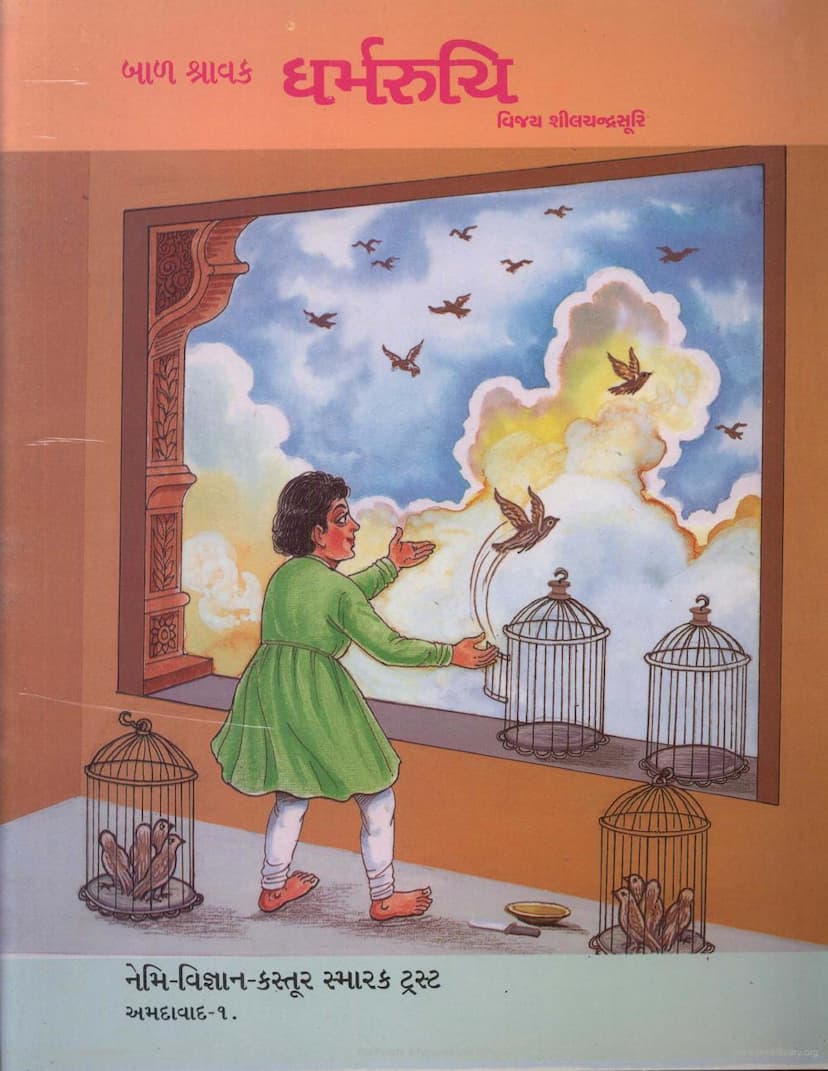Bal Shravaka Dharmaruchi
Added to library: September 1, 2025

Summary
Here's a comprehensive summary of the Jain text "Bal Shravaka Dharmaruchi" by Shilchandrasuri, based on the provided pages:
Book Title: Bal Shravaka Dharmaruchi (Young Lay Follower Dharmaruchi) Author: Vijayashilchandrasuri Publisher: Nemi Vigyan Kastur Smarak Trust, Ahmedabad
This book, "Bal Shravaka Dharmaruchi," is a beautifully illustrated story intended to inspire children and guide them towards righteous living according to Jain principles. It narrates the life and exemplary conduct of a young boy named Dharmaruchi, highlighting the core Jain values of Virati (renunciation/restraint) and Jivadaya (compassion for living beings).
Core Message:
The central theme of the book is that true Jainism is about being paramarthi (altruistic) and paragaju (helpful to others), even to the point of sacrificing one's life for the well-being of others, rather than harming any living being. A true Jain remains steadfast in their vows and principles, even in the face of extreme adversity. The book emphasizes that acting with integrity and righteousness can elevate even a person of modest means to a position of respect and leadership.
The Story of Dharmaruchi:
The narrative begins with an explanation of the importance of good sanskaras (upbringing and moral values), which are considered more valuable than being born into a good family. These sanskaras are cultivated through personal effort and are the true wealth of a soul.
The story introduces Dharmaruchi, the son of a wealthy and virtuous merchant named Manibhadra in the ideal village of Dhanyapur. From a very young age, Dharmaruchi displayed a strong inclination towards religious practices and developed a deep love for Jain Dharma. His father, recognizing and nurturing this, provided him with education, particularly in religious scriptures.
By the age of twelve, Dharmaruchi had become deeply immersed in Jain teachings and virtues. He was known for his peaceful nature, pleasant company, and extensive knowledge of religious texts, which even impressed elders. His association with Jain monks led him to take vows (vrata) as a lay follower (shravak) at a very young age, indicating his innate understanding and devotion. The text mentions that Jain parents often instill these values from infancy through lullabies, emphasizing the importance of ahimsa (non-violence) and satya (truthfulness).
The Ordeal:
The narrative then shifts to a challenging episode in Dharmaruchi's life. While playing with friends on the outskirts of the village, a group of robbers attacked. In the ensuing chaos, Dharmaruchi, distinguished by his valuable jewelry, was separated from his friends and abducted by the robbers. They stole his belongings and sold him into slavery.
He was brought to Ujjain's slave market, a place of immense cruelty and dehumanization. The story vividly describes the pitiable state of the enslaved, bound by iron chains, and the callousness of the buyers.
The Royal Chef's Demand:
In this market, the King's chef, who was seeking a young boy to assist in the royal kitchen, noticed Dharmaruchi. The chef, accustomed to the brutal practices of the market, purchased Dharmaruchi like an animal and took him to the royal kitchen.
The chef, without any empathy, ordered the young Dharmaruchi to slaughter the birds kept in a cage for the King's meal. Dharmaruchi, horrified at the thought of killing innocent creatures, was deeply disturbed. Despite his thirst and hunger, his commitment to his vows took precedence. He firmly refused to harm the birds, stating his vow of non-violence.
Dharmaruchi's Steadfastness and the King's Intervention:
The chef, enraged by Dharmaruchi's defiance, threatened and beat him. However, Dharmaruchi remained resolute. His internal strength and devotion to his vows were evident even in his suffering.
Fortuitously, the King, residing in an adjacent chamber, heard the commotion. Upon investigation, he learned of Dharmaruchi's unwavering commitment to his principles, even in the face of severe punishment. Intrigued by the boy's bravery and conviction, the King summoned Dharmaruchi.
The King's Test and Dharmaruchi's Wisdom:
Brought before the King, Dharmaruchi, despite his weakened state, fearlessly explained his vows and his commitment to ahimsa. The King, attempting to test his resolve, argued that as a slave, he was bound to obey his master and that his vows were irrelevant. However, Dharmaruchi countered with profound wisdom, stating that while his body might be enslaved, his soul and his vows remained his own. He argued that if the King did not like suffering or death, he should not inflict it upon innocent creatures. He offered to die rather than commit violence, emphasizing the greater suffering of the voiceless birds.
The King's Admiration and Dharmaruchi's Elevation:
Impressed by Dharmaruchi's courage, wisdom, and unwavering adherence to his principles, the King was deeply moved. He realized the boy's extraordinary character and the value of such a virtuous individual. Instead of punishing him, the King declared Dharmaruchi his personal bodyguard and appointed him the governor of a province.
The Outcome and Moral:
Dharmaruchi lived a life of comfort and respect, not forgetting his sanskaras. He was reunited with his family and continued to uphold his Jain principles throughout his life. In his later years, he renounced worldly possessions and took diksha (initiation into monkhood), achieving the ultimate spiritual liberation.
The book concludes by reiterating that true happiness and fulfillment come from cultivating strong sanskaras. These virtues are independent and lead to a life of purpose and prosperity, even attracting happiness without seeking it. The story of Dharmaruchi serves as a powerful testament to the strength of character, the importance of upholding one's vows, and the profound rewards of living a life guided by Jain principles.